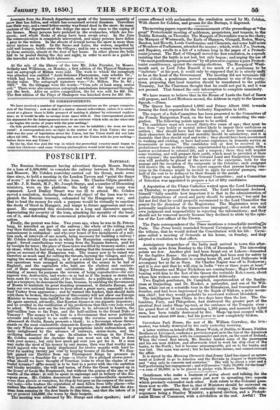POSTSCRIPT.
SATURDAY.
The Russian Government having advertised through Messrs. Baring for a loan of 5,500,0001. to complete the railway between St. Petersburg and Moscow, Mr. Cobden yesterday carried out his threat, made some time since, to hold a meeting in the London Tavern and "point the finger of scorn" at the negotiators of the loan. Mr. Charles Gilpin presided ; and Mr. J. B. Smith, M.P., Mr. Joseph Sturge, and a number of Dissenting ministers, were on the platform : the body of the large room was crammed. Lord Dudley Stuart was too ill to attend. Mr. Cobden moved a resolution, declaring that the real object of the loan was to re- plenish the Russian treasury, exhausted by the Hungarian war; and that to lend the money for such a purpose would be virtually to sanction the deeds of blood in Hungary, and tempt to future aggression and con- quest. He supported this resolution in a long and discursive speech, depreciating the security of the loan, attacking the morality of the lend- ers of it, and defending the economical principles of his own course of action.
Firstly, the pretext was false. Two years ago, when he was in St. Peters- burg, he travelled on part of the railway ; the whole of the rolling stock was then finished, and the rails are now on the ground ; only a part of the embankment is unfiniShed : and who ever heard of five instalments of a mil- lion each, at intervals of one month, being necessary for baildin4. a railway ? Mr. Cobden detailed the mode in which the Hungarian campaign was ma- naged : forced contributions were wrung from the Russian farmers, paid for by receipts for taxes ; the place of those taxes was filled by treasury-notes ; and an ukase, which he had read, was issued, stating that the treasury-notes were given on account of the Hungarian war. The money now to be raised was therefore as much used for cutting the throats, burning the villages, and out- raging the women of allin nav-, as if not a soldier had yet marched. The war operations were in anticipation of the money to be had of England; and the capitalists who lend are the abettors and carriers- out of those arrangements and calculations. In political economy, the lending of money for purposes the reverse of being reproductive—for out- rageous war, destruction, and waste—is as bad as if the money or stores had been sunk for ever in the midst of the Atlantic. As a politician, as a citizen, and as a taxpayer, he denounced the loan, because, by enabling the Government of Russia to maintain its great standing armament, it disturbs Europe, and tasks our own national finances to keep afloat a great navy, especially to de- fend Turkey from aggression ; and he warned the lenders, that should faith with them be broken, the taxpayers of this country will not allow our Foreign Minister to become bum-bailiff for the collection of their dishonoured debts. He again asserted, advisedly, that Russian finance is one gigantic imposture; and he exulted in the verification of his predictions that this very loan would be asked. Where now are the two millions to be advanced to Austria, the half-million loan to the Pope, and the half-million to the Grand Duke of Tuscany ? The money is to be lent to a Government that never publishes accounts and is subject to no audit—among the revenue accounts in the Almanaeh de Gotha, Russia presents a blank; to a Sovereign whose throne stands on the most combustible elements in Europe-20,000,000 male serfs-- the only White slaves--surrounded by populations lately enfranchised, and daily enlightened by the advance of railways, steam-boats, and the civilizing influences of the age. In allusion to writings in the Times, Mr. Cobden assailed the doctrine that you must not ask what is done with your money, but only how much per cent you get for it. If a man may make the most of his money by any means, then was that worthy man much injured who was lately imprisoned for twelve months with hard la- bour for making twenty per cent by keeping houses of ill-fame. We Eng- lish gained our liberties from our Plantagenet Kings by pressure on their poverty—a franchise for a loan—a liberty for a pledged crown-jewel : what should we have thought of Venetian loans to nvet the chains of our feudal tyranny ? sone money is to be lent to a power with the vile ambition and bloody brutality, the will and tastes, of Peter the Great wrapped up in the livery of Louis the Fourteenth, but without the genius of the one or the wealth of the other : it will be spent in espionage and in bribery of the Eu- ropean press. Mr. Cobden denounced those men—indescribable monsters, worse than ghouls or vampires, for they do but prey on the corpses of the mate- rial body—who traduce the reputation of men fallen from lofty places—who traduce the character of noble foes. In conclusion, he stated that the Aus- trian loan remains in the first hands to this time, and that the takers of it are at present 145,0001. the worse by their bargain.
The meeting was addressed by Mr. Sturge and other speakers ; and of course affirmed with acclamations the resolution moved by Mr. Cobden. With cheers for Cobden, and groans for the Borings, it dispersed.


























 Previous page
Previous page